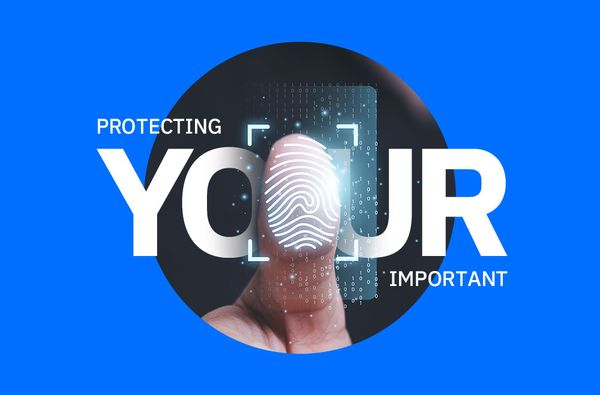What’s love got to do with it? 4 in 5 Valentine’s Day-themed spam emails are scams, Bitdefender Antispam Lab warns
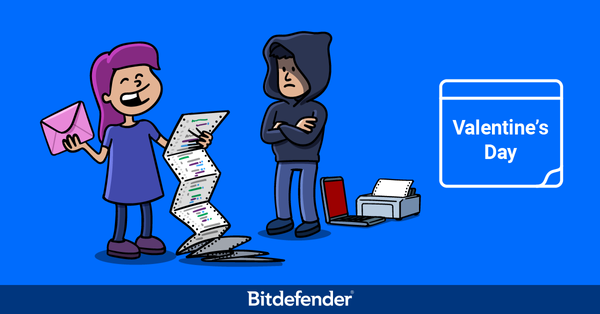
In cybersecurity, Valentine’s Day always heralds one thing: a scam wave washing across the digital landscape.
Threat actors are always looking to defraud digital citizens ahead of Feb. 14, some last-minute shopping for a loved one or the need to connect with someone could turn into a dangerous mash-up.
In 2023, the mid-February celebration of love is preceded by a deluge of unsolicited correspondence that aims to lure people into giving out personal information or purchasing a romantic gift for their partner.
Some 83% of Valentine’s-themed spam emails scanned by Bitdefender filters between Jan. 22 and Feb. 8 were marked as scams, according to our Antispam Lab. Even with a rough start, the Valentine’s-themed spam rate increased considerably during the past week, with notable spikes between 6 and 8 of February (see Figure 1).
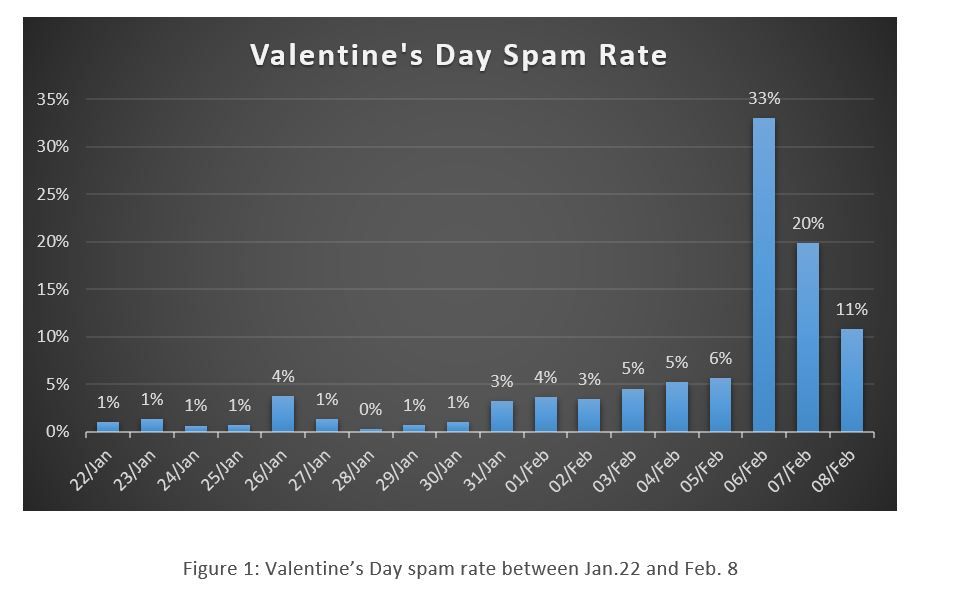
As expected, scammers were keen on targeting predominantly English-speaking consumers, with the United States hit by 45% of the correspondence, followed by Ireland at 7% and the UK at 5%.
Fraudulent correspondence also ended up in Australia and countries across Europe and the Asia-Pacific region (see Figure 2).
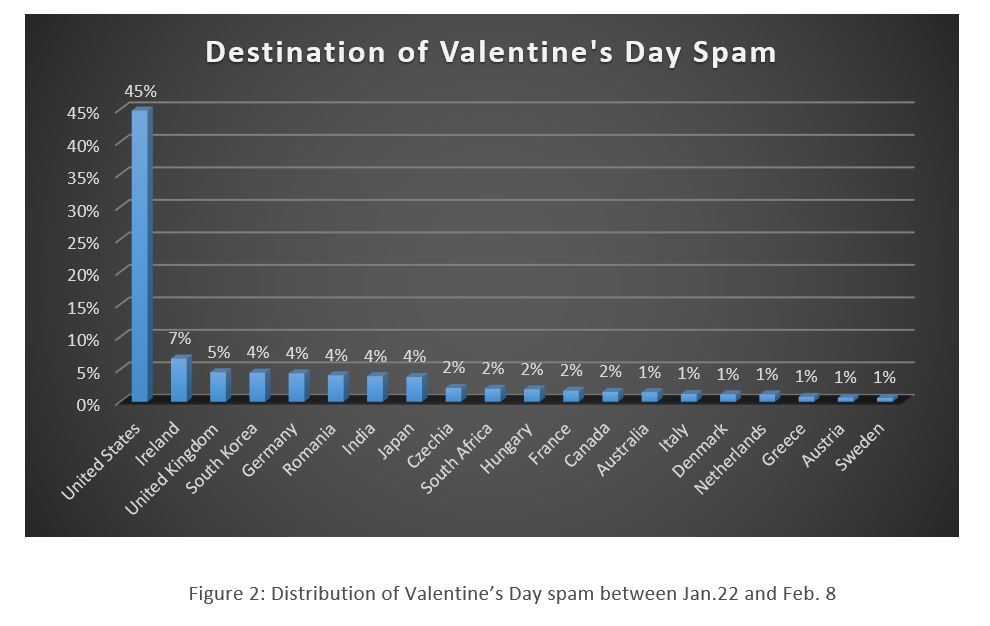
A glance at this year’s Valentine’s Day spam landscape reveals that cybercriminals stick to recycling past shenanigans, repurposing old spam campaigns to exploit consumers’ interest. We’ve noticed fraudulent offers for jewelry, flower arrangements and cosmetics, as well as decade-old scam emails promoting male enhancement pills and “science-backed” techniques “studied by scientists from Harvard, Yale, and Oxford” to help spice up your loved life.
Here’s a taste of the 2023 Valentine’s Day spam subjects:
- the perfect romantic rose bear gift is here to ensure your loved one feels truly loved
- up to 93 off canvas sales valentine's day
- spice up your life with a new romance
- 15 bottles of wine to celebrate valentine s day
- confirmation receipt 100 valentine s day gifts
- ukrainian woman are near you date them for valentine
- Gentlemen, Are You Ready For Valentine's Day?
People looking for love, were also among the preferred targets for spammers, with most Valentine’s Day scam correspondence split between traditional phishing emails and online dating schemes.
One example, which cited the war in Ukraine, targeted single men in the UK. The scammers advertise an online dating platform where they can meet some of “the most beautiful women in the world.”
Other analyzed samples include a phony survey offering participants a flower arrangement valued at $100, teddy bears and jewelry.
Samples of Valentine’s Day-themed spam:


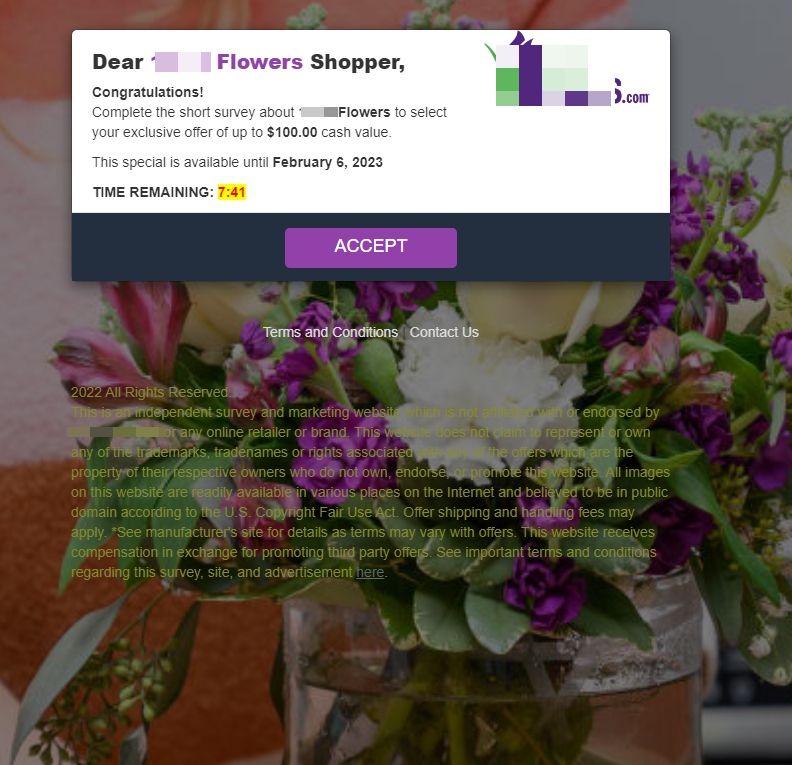



How can you stay safe online on Valentine’s
Valentine’s Day is an important event in the calendar of cybercrooks who exploit the habit of gift purchasing and dating in February. If you still haven’t bought your partner or romantic interest a gift this year, or if you’re thinking of trying your luck at online dating, make sure to follow strict cyber hygiene to protect your money and data:
- Don’t open emails or access links promising too-good-too-be-true deals or promotions from retailers you don’t know
- Always research unfamiliar retailers, brand names or offers online before purchasing gifts or Valentine’s Day accessories and meals
- Check for lookalike domains, spelling errors and unfamiliar email senders
- Stick to well-known retailers and official websites when browsing for gifts
- Be wary of new people you meet via dating platforms, and never share personal data or access links or transfer money
- Never access connection requests from individuals you don’t know and claim that they’re looking for a new romance
- Use a security solution to defend against phishing, fraudulent websites and malware
Add an extra layer of security and privacy to your devices when shopping for Valentine’s Day gifts with Bitdefender's all-in-one security plans. With anti-phishing and advanced threat detection to block nasty internet threats, ransomware protection, VPN for safe shopping, dedicated Password Manager, and identity theft protection (depending on chosen plans), you can steer clear of malicious attacks and protect your identity and money.
tags
Author
Alina is a history buff passionate about cybersecurity and anything sci-fi, advocating Bitdefender technologies and solutions. She spends most of her time between her two feline friends and traveling.
View all postsRight now Top posts
Outpacing Cyberthreats: Bitdefender Together with Scuderia Ferrari HP in 2025
March 12, 2025
Streamjacking Scams On YouTube Leverage CS2 Pro Player Championships to Defraud Gamers
February 20, 2025
How to Identify and Protect Yourself from Gaming Laptop Scams
February 11, 2025
Your Device ‘Fingerprint’ Will Go to Advertisers Starting February 2025
December 24, 2024
FOLLOW US ON SOCIAL MEDIA
You might also like
Bookmarks







